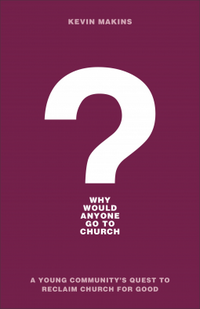 |
Why Would Anyone Go to Church? A Young Community’s Quest to Reclaim Church for Goodby Kevin Makins eARC, 192 pg. Read: June 21, 2020 |

I’m sort of torn about this one. So bear with me. Let’s start with the book blurb:
A young community discovers why, despite everything, church still matters
There are plenty of reasons to criticize, judge, and even walk away from the church. When Kevin was twenty-three and didn’t know any better, he started a congregation with some friends who were on the edge of faith. Together they hoped to discover whether the church was worth fighting for. In this brutally honest account, he shares their story of becoming a community of misfits, outcasts, and oddballs who would learn that, even with all its faults, the church is worth being a part of . . . and must be reclaimed for good.
If you’ve been burned or burned out by the church, if you’ve been silenced or misunderstood, if you’ve left or never even joined in the first place, this candid, hopeful book is your invitation to consider what you miss out on when you give up on church—and what the church misses out on when it gives up on you.
That last paragraph is the dicey one for me—it fits the title, Why Would Anyone Go to Church?. But I don’t think the book delivers that, at all. That’s what I read the book for, that’s what I wanted to get (don’t get me wrong, I have answers already, I just wanted to see what this “Young Community” had to offer along those lines), but on those counts, I came away empty-handed.
So what did Makins fill these 192 pages with? Well, something along the lines of the subtitle, A Young Community’s Quest to Reclaim Church for Good.* The church that Makins pastors, Eucharist Church in Hamilton, ON, began meeting in 2010 in an impovrished—and largely churchless—part of the city. They struggled with focus, with identity, with location. But what they had—a sense of community and purpose—carried them through. The book outlines their struggles, triumphs, failings, and perseverance.
* I do think it’s unnecessarily combative—also unproven—to say that the Church is in need of any such reclamation. But that’s for another day.
That’s all I found in these pages, and that’s more than enough. It’s an inspiring story. I’m not sure I’d have picked the book up if that’s what was advertised, but I might have. It would’ve been my loss if I hadn’t.
Are there some lessons that new—or established churches—can take from their story? Yes, there are several that can be extrapolated. But as Makins makes a point of—often—this is a congregation that takes its shape and identity from its community. So much of what he recounts isn’t something that can be duplicated, nor should anyone try (I don’t think Makins suggests that, either).
I’ve repeatedly resolved to read outside my tradition, and repeatedly failed—I do it occasionally, but not as often as I could. I’m pretty sure Makins is about as far outside as I can go and still remain in the bounds of orthodoxy. While I have some problems with the book, it was an encouraging read, reminding me of the truth that, “the purest churches under heaven are subject both to mixture and error” and that part of that mix is a faith that can inspire. Just be sure you know what you’re getting into with this book.
If you come into it with the proper expectations, you should come out of it with a valuable experience. If you come for what the blurb and title suggests? You’ll be disappointed.
Disclaimer: I received this eARC from Baker Books via NetGalley in exchange for this post—thanks to both for this.

This post contains an affiliate link. If you purchase from it, I will get a small commission at no additional cost to you. As always, opinions are my own.
![]()



Read Irresponsibly, but please Comment Responsibly